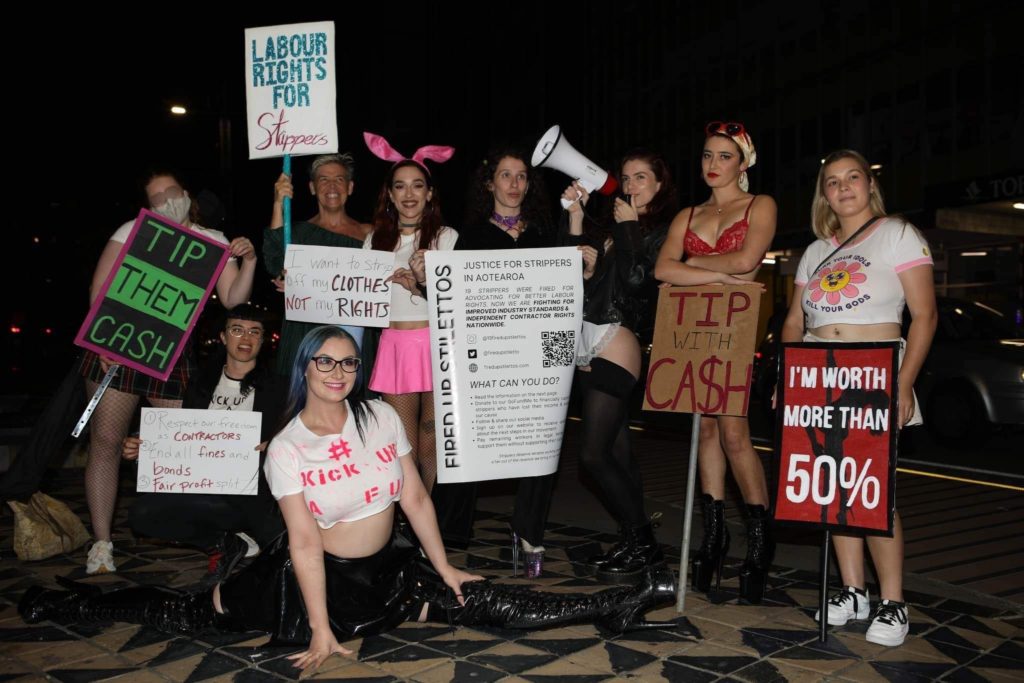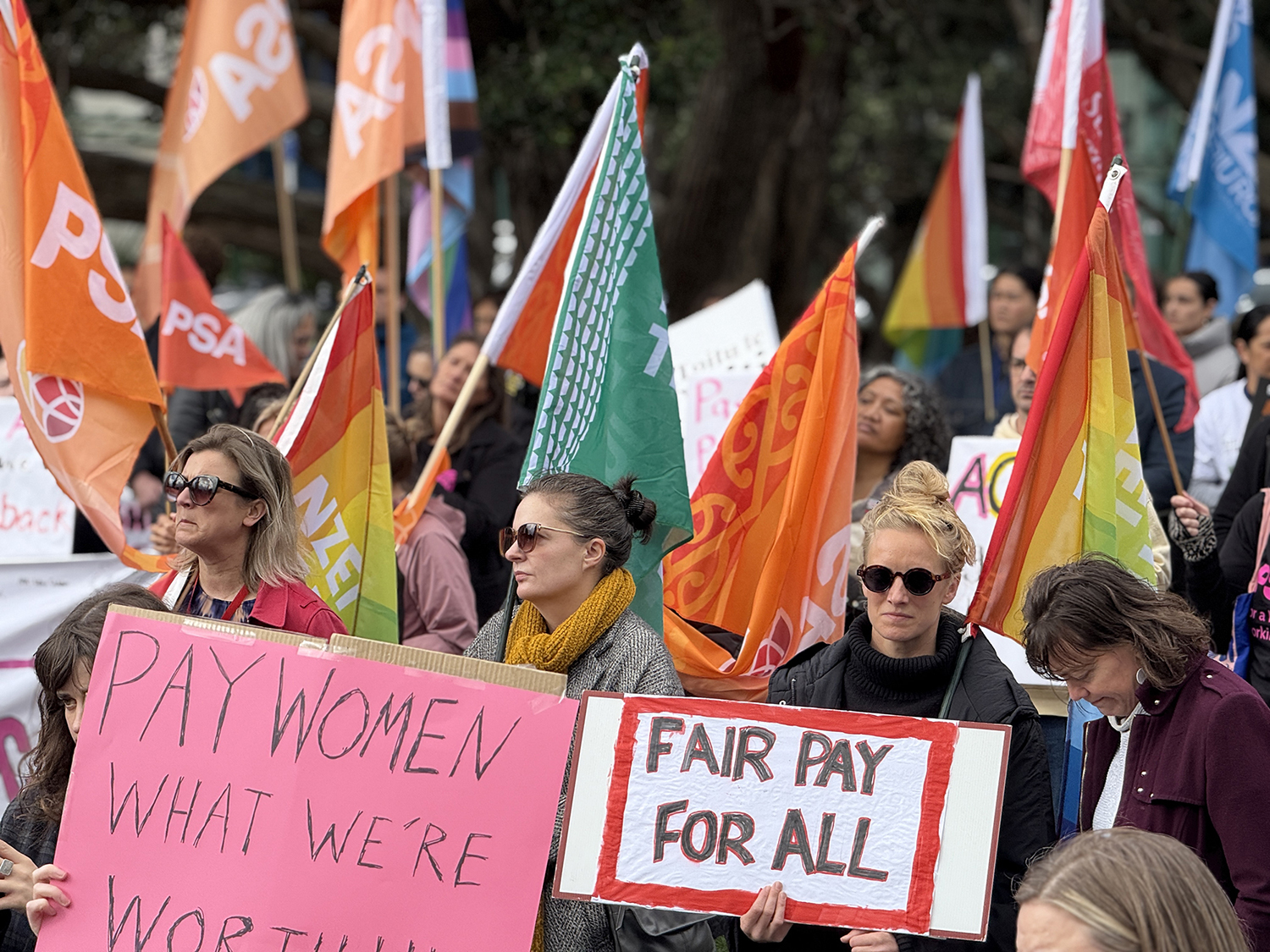A large crowd gathered on Dixon Street last night to rally in support of 19 strippers who had been unfairly sacked from Calendar Girls strip club for attempting to renegotiate their contracts. These workers have begun organising under the name Fired Up Stilettos, launching a petition to end labour violations in adult entertainment, a gofundme to raise campaign funds and various social media pages to raise awareness. The rally last night was the second protest that the group has held outside Calendar Girls. The call to action on the facebook event read:
Make noise in solidarity with the Fired Up Stilettos as we battle to improve the industry standards and break down stigma for strippers all across Aotearoa!
Wear as little as you dare and show us your pole tricks in Te Aro Park from 11pm. It’s time to show clubs across the country that the stigma they have been relying on to exploit us isn’t going to work anymore. ENOUGH IS ENOUGH! It will be a night to remember for a bloody good cause.
This action is part of an ongoing campaign to agitate for better conditions in the adult entertainment industry. Their stated goal is to “see a nationwide industry standard that protects strippers from unfair treatment.” Fired Up Stilettos are encouraging workers from other clubs, and from around the country, to join the campaign.
The protest itself was large, lively, and well organised. Expert crowd-managers, the organisers deftly wove together the chaotic energy of Dixon Street on a Saturday night with the political clarity of their kaupapa in an atmosphere that was both militant and fun. Strippers attended in their costumes, organisers wore pink fluorescent vests with “kick up a FUS” stamped on the back. A pole was set up and impressive routines were performed to chants of “what do we want? Justice!” and “Calendar Girls exploits its workers!” Bedazzled signs called for respect, fair pay and labour rights. “Worth more than 50%” one sign declared, referring to the fact that Calendar Girls had recently introduced a contract only offering a 44% – 50% cut of profits for dancers. “We want a venue, not a pimp” another sign read.
The actions of the employers in this dispute have been particularly disgusting. The sacking of these 19 workers was prompted by them co-signing an email asking to renegotiate their contracts. Their demands were to reinstate a 50% minimum cut of profits for dancers, and to receive weekly invoices with their pay. The response of the club was to sack the dancers as a group, publicly and without notice, via a facebook post. They were told to “collect [their] belongings” from the dressing room and “clear out [their] lockers.” Fired Up Stilettos’ campaign has shed further light on grotty practices in the industry, such as the outrageous fines which dancers are subjected to for minor “infringements” such as “unkempt appearance” ($100 fine) and “loitering in changing rooms” ($200 fine). As detailed on the Fired Up Stilettos petition:
We have collected contracts from numerous adult entertainment venues in Aotearoa New Zealand which violate our independent contractor status by proposing dancers pay exorbitant fines for not being at work at a time management decides, or leaving before management wants us to. They have introduced fines that compel us to take our underwear off at a certain time on stage, and keep it off while walking around to collect tips. The most egregious fees prohibit “rudeness” (as determined solely by management) toward management or customers, and “demanding” customers pay us for our labour (also known as asking for a tip–one of the only ways we get paid).
There can be no doubt that sexism plays a large role in the position these workers find themselves in. Their undervalued status as mainly women workers, and as workers in the adult entertainment industry, has led employers to feel that they can act with impunity. It is an illustration of the way that the marginalisation of work such as stripping leaves workers vulnerable to abuse and exploitation.
The status of contract workers is often ambiguous, and this ambiguity is exploited by employers. As Fired Up Stilettos write in their statement, “currently clubs exploit their workers by shifting all tax and ACC levy responsibilities and work-related expenses onto them, while providing none of the rights and freedoms to which independent contractors are legally entitled” they write that despite being classed as independent contractors, they are “overwhelmingly treated like employees” and that “nationwide, dancer contracts are predatory by nature and riddled with fines, retainer bonds and clauses forbidding work at competing venues and media engagement.” This is a situation that will resonate with other workers in New Zealand, for instance those in the film industry. Since the passing of the “Hobbit Law” in 2010, film workers have been barred from collective bargaining and have been able to be employed full time as contractors. By passing this law the government effectively ensured film makers a cheap workforce with limited ability to assert their rights. Appalling working conditions and outright bullying have been rife across the film industry since the passing of this law, with non-disclosure clauses hindering workers from being able to openly protest these conditions. Punitive contracts have long kept strip club workers silent, likewise, and one of the things which the Fired Up Stilettos campaign is doing is effectively blowing the whistle on such practices.
Employing workers on individual contracts can also serve to divide them and stop them from thinking and acting collectively as workers. The workers of Fired Up Stilettos pushed against this when they co-signed the email request for negotiation, and they are pushing against it further in their campaign to bring workers in the adult entertainment industry together nationally to agitate for better rights. Collective action and solidarity was very much the spirit of the rally. Chants included “ho ho, hey hey, strippers deserve fair pay” and “strippers’ rights are workers rights.” Placards called for “labour rights for strippers.” The organisers’ strategy at this point is not to picket the club or to call on other dancers to walk off the job. The rally did, however, draw curious crowds from Calendar Girls, who were then given flyers with information about the mistreatment of workers. Placards and chants at the rally called on patrons to “tip cash,” a way for dancers to keep their earnings out of the hands of the club. The organisers called the protest at the park across the road from Calendar Girls, and some protesters took it upon themselves to leaflet directly outside the club. According to an organiser on the megaphone, there was support for the action among the dancers still working that night, as they understood the issues which had led to the action. A flag from the Tertiary Education Union flew at the rally, and gestures of support have also come from First Union and Unite Union.
Fired Up Stilettos are demonstrating that collective action is possible in industries where contract status is used to militate against such actions, and there have been developments in other industries which hint at further potential in this area. A 2022 Act repealed parts of the “Hobbit Law”, requiring film companies to have a written contract with minimum conditions for workers, and allowing for collective negotiation over disputes (but not strike action). In the Theatre Industry, the performing arts union Equity undertook collective bargaining in April 2022, in what was reported as a “first-of-its-kind” action. Members of Equity, which historically has acted more as a professional association than as a trade union, went into collective negotiations with Court Theatre in Christchurch and voted to accept a collective contract that secures better pay rates, better conditions and stronger protections for theatre workers.
Precarity has long been used by employers as a tool to stop workers from asserting themselves; whether it is achieved by using casual contracts, zero-hour contracts, fixed-term contracts; by exploiting workers’ visa status; or by exploiting a lack of oversight to get away with illegal dismissals. This has meant that even when workers in these industries (and the collectives that represent them) do take action, they do so cautiously. In the case of workers in the adult entertainment industry, the social marginalisation of this work and the stigma often attached to it compounds these problems. What Fired Up Stilettos will demonstrate with their ongoing campaign is what can be achieved when workers dare to go public and encourage others to agitate openly around these issues ( it’s no accident that one of their slogans is “kick up a FUS”). These workers have the determination to see this campaign through, and their successes may have effects throughout their industry and beyond.









